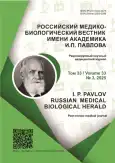Comparative analysis of the results of using mechanical methods of prophylactic hemostasis in endoscopic removal of large polypoid masses of colon mucosa
- Authors: Natalsky A.A.1, Filimonov V.B.1, Shadsky S.O.1, Ustinov F.S.1, Pashkin K.P.1, Goldshlak N.B.1
-
Affiliations:
- Ryazan State Medical University
- Issue: Vol 33, No 3 (2025)
- Pages: 361-368
- Section: Original study
- Submitted: 09.11.2023
- Accepted: 16.01.2024
- Published: 30.09.2025
- URL: https://journals.eco-vector.com/pavlovj/article/view/623164
- DOI: https://doi.org/10.17816/PAVLOVJ623164
- EDN: https://elibrary.ru/VKWJIW
- ID: 623164
Cite item
Abstract
INTRODUCTION: Bleeding is the most common complication of endoscopic resection of mucous membrane of a hollow organ, which most often accompanies removal of large polypoid masses (PMs). However, currently endoscopic techniques have been developed that allow for effective prevention of this complication.
AIM: Comparison of the effectiveness of endoscopic methods of preventing bleeding when removing large PMs of colonic mucosa: prophylactic clipping and prophylactic ligation of polyp stalk.
MATERIALS AND METHODS: The study included patients with single pedunculated PMs with a feeding stalk of ≥ 5 mm thickness, located in different parts of the colon. Exclusion criteria were the presence of other large (≥ 10 mm) epithelial masses in the colon, as well as the use of antiplatelet agents and anticoagulants. Patients of group A (n = 32) were planned to undergo bleeding prevention by ligating the PM stalk using an original ligating device, patients of group B (n = 32) by prophylactic clipping of the stalk with a metal endoclip. The time of surgical intervention, intraoperative and immediate postoperative bleeding rate were compared, and technical difficulties in the use of prophylactic hemostasis techniques were recorded.
RESULTS: Sixty-one out of sixty-four surgical interventions were performed without technical difficulties. In two cases, prophylactic clipping of the stalk was initially planned, but during the surgical intervention ligation was used due to technical peculiarities of the operation. The average time of surgical intervention using the prophylactic ligation method was (16 ± 3) minutes, using clipping — (12 ± 2) minutes. No bleeding was recorded during surgical interventions and in the immediate postoperative period in any of study cases.
CONCLUSION: Both methods provide reliable prophylactic hemostasis, effective in almost 100% of cases. However, the prophylactic clipping method has a number of technical limitations: it should be used with caution when removing a PM with a short or a thick stalk. In these cases, the method of choice for the endoscopist may be the prophylactic ligation.
Keywords
Full Text
About the authors
Alexander A. Natalsky
Ryazan State Medical University
Email: lorey1983@mail.ru
ORCID iD: 0000-0002-2387-3440
SPIN-code: 6503-4327
MD, Dr. Sci. (Medicine), Professor
Russian Federation, RyazanVictor B. Filimonov
Ryazan State Medical University
Email: Filimonov1974@mail.ru
ORCID iD: 0000-0002-2199-0715
SPIN-code: 7090-0428
MD, Dr. Sci. (Medicine)
Russian Federation, RyazanStanislav O. Shadsky
Ryazan State Medical University
Author for correspondence.
Email: sshadskiy@icloud.com
ORCID iD: 0000-0001-7454-3292
SPIN-code: 6653-6883
MD, Cand. Sci. (Medicine)
Russian Federation, RyazanFilipp S. Ustinov
Ryazan State Medical University
Email: ustinoffsurg@yandex.ru
ORCID iD: 0009-0008-7923-5617
MD, Cand. Sci. (Medicine)
Russian Federation, RyazanKorneli P. Pashkin
Ryazan State Medical University
Email: korneli@yandex.ru
ORCID iD: 0000-0002-1588-6989
SPIN-code: 9478-7313
MD, Cand. Sci. (Medicine)
Russian Federation, RyazanNikolay B. Goldshlak
Ryazan State Medical University
Email: goldnick@bk.ru
ORCID iD: 0009-0007-3690-5062
Russian Federation, Ryazan
References
- Kandel P, Wallace MB. Colorectal endoscopic mucosal resection (EMR). Best Pract Res Clin Gasroenterol. 2017;31(4):451–471. doi: 10.1016/j.bpg.2017.05.006
- Bénard F, Barkun AN, Martel M, von Renteln D. Systematic review of colorectal cancer screening guidelines for average-risk adults: Summarizing the current global recommendations. World J Gastroenterol. 2018;24(1):124–138. doi: 10.3748/wjg.v24.i1.124
- Kashin SV, Hekhaykova NV, Zavyalov DV, et al. The colorectal cancer screening: the current global situation and the main standards for the quality of screening colonoscopy recommended by the European Society of Gastrointestinal Endoscopy (ESGE). Russian Journal of Evidence-based Gastroenterology. 2017;6(4):32–52. doi: 10.17116/dokgastro20176432-52 EDN: YLVMJV
- Malikhova OA, Zavyalov DV, Kashin SV, et al. Guidelines for the endoscopic diagnosis, treatment and follow-up of patients with epithelial neoplasms of the colon. 2022. Journal of Modern Oncology. 2023;25(1):5–14. doi: 10.26442/18151434.2023.1.201972 EDN: XJXYNC
- Ma MX, Bourke MJ. Complications of endoscopic polypectomy, endoscopic mucosal resection and endoscopic submucosal dissection in the colon. Best Pract Res Clin Gastroenterol. 2016;30(5):749–767. doi: 10.1016/j.bpg.2016.09.009 EDN: YWIYZB
- Kapetanos D, Beltsis A, Chatzimavroudis G, Katsinelos P. Post-polypectomy bleeding: incidence, risk factors, prevention, and management. Surg Laparosc Endosc Percutan Tech. 2012;22(2):102–107. doi: 10.1097/sle.0b013e318247c02e
- Parshoeva LSh, Parshoeva BSh. Treatment of colon polyps. Prevention of colorectal cancer. Science Gerald. 2022;4(7):120–123. Available from: https://www.вестник-науки.рф/article/6079. Accessed: 09.11.2023. EDN: KBNPFX
- Kouklakis G, Mpoumponaris A, Gatopoulou A, et al. Endoscopic resection of large pedunculated colonic polyps and risk of postpolypectomy bleeding with adrenaline injection versus endoloop and hemoclip: a prospective, randomized study. Surg Endosc. 2009;23(12):2732–2737. doi: 10.1007/s00464-009-0478-3 EDN: ZOPBWY
- Natalsky AA, Filimonov VB, Shadsky SO, et al. Prevention of bleeding in polypectomy. Pirogov Russian Journal of Surgery. 2023;(10):53–59. doi: 10.17116/hirurgia202310153 EDN: GFFVLM
- Tullavardhana T, Akranurakkul P, Ungkitphaiboon W, Songtish D. Efficacy of submucosal epinephrine injection for the prevention of postpolypectomy bleeding: A meta-analysis of randomized controlled studies. Ann Med Surg (Lond). 2017;19:65–73. doi: 10.1016/j.amsu.2017.05.035
- Parikh ND, Zanocco K, Keswani RN, Gawron AJ. A cost-efficacy decision analysis of prophylactic clip placement after endoscopic removal of large polyps. Clin Gastroenterol Hepatol. 2013;11(10):1319–1324. doi: 10.1016/j.cgh.2012.12.044
- Boujaoudé J, Honein K, Hobeika E, et al. [Endoscopic resection of large pedunculated colonic polyps using the Endoloop: Report of three cases and review of the literature]. J Med Liban. 2006;54(4):221–224.
- Boumitri C, Mir FA, Ashraf I, et al. Prophylactic clipping and post-polypectomy bleeding: a meta-analysis and systematic review. Ann Gastroenterol. 2016;29(4):502–508. doi: 10.20524/aog.2016.0075
- Katsinelos P, Kountouras J, Paroutoglou G, et al. Endoloop-assisted polypectomy for large pedunculated colorectal polyps. Surg Endosc. 2006;20(8):1257–1261. doi: 10.1007/s00464-005-0713-5 EDN: QVCNKV
- Natalsky AA, Filimonov VB, Shadsky SO, Pashkin KP. Method for safe removal of polypoid epithelial neoplasms of the colon mucosa using preliminary prophylactic ligation. Science of the Young (Eruditio Juvenium). 2024;12(2):273–282. doi: 10.23888/HMJ2024122273-282 EDN: SCPWAK
Supplementary files













